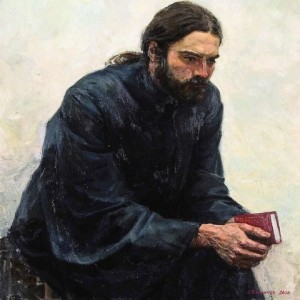Philokalia Ministries
Episodes
Thursday Oct 12, 2017
The Ascetical Homilies of Saint Isaac the Syrian - Homily Twenty-one Part I
Thursday Oct 12, 2017
Thursday Oct 12, 2017
Tonight was a wonderful journey with St. Isaac as he visited with one exemplar after another of the solitary life; describing along the way the particular virtues they possessed, how they prayed and the lessons they taught.
The solitary life is unique in the value it gives to the pursuit of stillness and unceasing prayer or as St Isaac often describes it - the Angelic life or Celestial husbandry. The solitary like those in other vocations must cling to their identity and the path that God has called them to walk. They must avoid the temptation to look aside to other things or practices that though clearly admirable do not fulfill the aim of their vocation. In this they become models of fidelity for us all.
Thursday Sep 28, 2017
The Ascetical Homilies of Saint Isaac the Syrian - Homily Twenty Part I
Thursday Sep 28, 2017
Thursday Sep 28, 2017
Homily 20 focuses on St. Isaac's teaching on the "sweet works of Night Vigil." That may sound somewhat amusing to modern ears. Night is typically seen as a time for well earned rest from one's daily labors. Yet for the Fathers night was the preferred time for prayer. Time and sleep are now to be seen in light of the coming of Christ at the Incarnation and our waiting for His second Coming. We watch now day and night in a spirit of sobriety for his coming.
Therefore, Isaac tells us there is no greater practice. To occupy oneself with God in vigil lifts the mind in quick flight as if it were on wings. If the mind is kept from dissipation during the day great gifts will be bestowed upon a soul and it will begin to look upon God with the eyes of Cherubim - adoring Him without ceasing and with a pure gaze.
This cannot, Isaac warns, be practiced in a vacuum. Stretching out ones hands out to God throughout the night, with the hardship of prolonged psalmody and standing will not produce fruit outside of the context of days spent in the sober pursuit of Him as well. If we allow ourselves to be filled with distraction during the day then we have no idea why we toil.
Thursday Sep 21, 2017
The Ascetical Homilies of Saint Isaac the Syrian - Homily Nineteen
Thursday Sep 21, 2017
Thursday Sep 21, 2017
How do we foster stillness and unceasing prayer in our lives? St. Isaac counsels us in Homily 19 to always keep our eye - the eye of the heart - fixed on God. This means not only fostering a virtuous life but also avoiding that which would pull us away from this aim. We must seek to free ourselves from obsessive concerns with the things of the world and from falling lockstep into its frenetic pace. Don't multiply the occupations of your life for in this you may very well be pushing God away. The spiritual life cannot be a part time occupation. It must be our life. God cannot be pushed to the margins nor can we neglect the grace he offers and its sweetness without quickly losing it. Meaningless chatter and the noise of dissipated converse destroys stillness as frost destroys new buds on the tree. A divided heart obscures the vision of God and his love. The ego and pride-driven self-interest draws us down into darkness. Only a humble and contrite heart is lifted up and exalted to share in the life of God.
Have we lost a clear sense of our identity in Christ? Has the faith been so obscured that we no longer invest ourselves in it but simply take what measure we desire?

Wednesday Jun 22, 2016
Conferences of St. John Cassian - Conference Twenty Three On Sinlessness Part III
Wednesday Jun 22, 2016
Wednesday Jun 22, 2016
What do we seek? What do we long for the most? Can any of us truly say Theoria, or contemplation; to be drawn up into the eternal blessedness of God through participation and by His grace? Do we seek to pray without ceasing as though it is that narrow path from which we seek not to stumble? Theonas begins in these first sections of Conference 23 to show Cassian and Germanus why contemplation of God has a dignity greater than all the dignity of righteousness and all the zeal of virtuousness. All things in this world will be unable to maintain their title of goodness if they are compared to the future age, where no mutability in good things and no corruption of true blessedness is to be feared! The Apostle Paul is the exemplar of one who desires the indissoluble fellowship with God above all things for himself and for others. He cries out: "I do not know what to choose. I am compelled on two sides, having a desire to be dissolved and to be with Christ, for that is far better, while remaining in the flesh is more necessary for your sake."

Wednesday Feb 10, 2016
Wednesday Feb 10, 2016
We come now to the conclusion of Conference 19 where Cassian and Germanus question Abba John about how one overcomes and does battle with vices that reemerge after the solitary life of the anchorite has been embraced. Abba John describes for them how they must engage in a kind of mental warfare - drawing the vices they see active in their hearts to mind and allowing themselves to be humbled by them and then apply the necessary reparation that is need; that is, apply the healing balm of penance and self rebuke to uproot the vestiges of these sins. The self-honesty as well as the self-awareness necessary for such an undertaking is great, especially since it is done without the support and guidance of others. The only vice where this is not to be done is fornication or unchastity. Since such vices arise out of and are connected to bodily appetites, the use of mental imagery could be very dangerous and simply draw one further into sin. Lengthy discussion ensued about renewing the asceticism that would even allow this kind of mindfulness and purity of heart to develop. In particular, the group discussed the importance of fasting in the humbling of mind and body and allowing one to recognize one's dependence on God. We must come to see once more the necessity of such practices, develop the resolve to embrace them, and take them up with love; acknowledging that they bring us freedom and draw us closer to Christ. We also spoke at length about the importance of not receiving the grace of God in vain. When receiving the grace and mercy of God through confession of our sins, we must take up the means available to us to repair the damage that the sin has inflicted; to uproot the vice and apply the healing balm.

Thursday Mar 12, 2015
Conferences of St. John Cassian - Conference Ten on Prayer Part III
Thursday Mar 12, 2015
Thursday Mar 12, 2015
After having considered the formula that the mind is to hold to ceaselessly, "O God, incline unto my aid, O Lord, make haste to help me", the group listened to Abba Issac describe the fruits that such a practice produces in the soul. Chief among them is poverty of spirit: nothing can be holier than that of one who realizes that he has no protection and no strength and who seeks daily help from God's bounty and who understands that his life and property are sustained at each and every moment by divine assistance. Such a person becomes the "Lord's beggar." With this comes the fruit of discretion, that allows one to penetrate the most sublime mysteries. The very dispositions of the psalms are taken into oneself, so that they arise from the heart not as another's words but as one's own. The meaning of the words come not through exegesis but through proof; that is, when our experience not only perceives but anticipates its thought. It will be as if we have become the author, grasping in anticipation the meaning of scripture; having received in power the Word rather than the simply the knowledge of it.Once the mind's attentiveness has been set ablaze, prayer pours forth in unspeakable ecstasy to God with unutterable groans and sighs.

Thursday Jan 17, 2013
Nepsis, Wakefulness, Attentiveness
Thursday Jan 17, 2013
Thursday Jan 17, 2013
How to Read the Fathers, What is Nepsis: Being present to where we are; Aliveness to God; the Mind as a sentry; Mindfulness; Attentiveness and Prayer must be combined; All the sense must be guarded as well as thoughts from demonic intrusions and temptations; the Relentlessness of the Demons; Necessity of Interrogating thoughts and questioning their origin; The never ending work of nepsis; Hatred for sin and swiftness in casting out sinful thoughts.